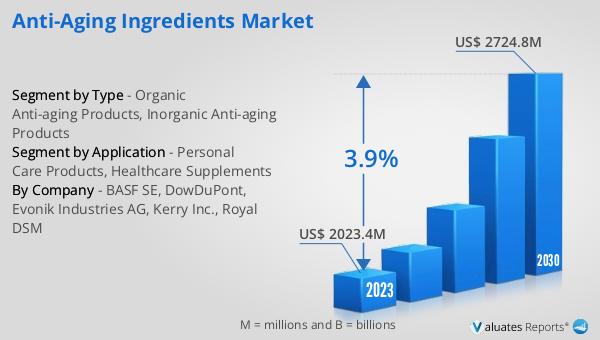List of Tables
Table 1. Global Anti-aging Ingredients Market Size Growth Rate by Type (US$ Million), 2019 VS 2023 VS 2030
Table 2. Key Players of Organic Anti-aging Products
Table 3. Key Players of Inorganic Anti-aging Products
Table 4. Global Anti-aging Ingredients Market Size Growth Rate by Application (US$ Million), 2019 VS 2023 VS 2030
Table 5. Global Anti-aging Ingredients Market Size Growth Rate (CAGR) by Region (US$ Million): 2019 VS 2023 VS 2030
Table 6. Global Anti-aging Ingredients Market Size by Region (2019-2024) & (US$ Million)
Table 7. Global Anti-aging Ingredients Market Share by Region (2019-2024)
Table 8. Global Anti-aging Ingredients Forecasted Market Size by Region (2025-2030) & (US$ Million)
Table 9. Global Anti-aging Ingredients Market Share by Region (2025-2030)
Table 10. Anti-aging Ingredients Market Trends
Table 11. Anti-aging Ingredients Market Drivers
Table 12. Anti-aging Ingredients Market Challenges
Table 13. Anti-aging Ingredients Market Restraints
Table 14. Global Anti-aging Ingredients Revenue by Players (2019-2024) & (US$ Million)
Table 15. Global Anti-aging Ingredients Revenue Share by Players (2019-2024)
Table 16. Global Top Anti-aging Ingredients by Company Type (Tier 1, Tier 2, and Tier 3) & (based on the Revenue in Anti-aging Ingredients as of 2023)
Table 17. Global Anti-aging Ingredients Industry Ranking 2022 VS 2023 VS 2024
Table 18. Global 5 Largest Players Market Share by Anti-aging Ingredients Revenue (CR5 and HHI) & (2019-2024)
Table 19. Global Key Players of Anti-aging Ingredients, Headquarters and Area Served
Table 20. Global Key Players of Anti-aging Ingredients, Product and Application
Table 21. Global Key Players of Anti-aging Ingredients, Product and Application
Table 22. Mergers & Acquisitions, Expansion Plans
Table 23. Global Anti-aging Ingredients Market Size by Type (2019-2024) & (US$ Million)
Table 24. Global Anti-aging Ingredients Revenue Market Share by Type (2019-2024)
Table 25. Global Anti-aging Ingredients Forecasted Market Size by Type (2025-2030) & (US$ Million)
Table 26. Global Anti-aging Ingredients Revenue Market Share by Type (2025-2030)
Table 27. Global Anti-aging Ingredients Market Size by Application (2019-2024) & (US$ Million)
Table 28. Global Anti-aging Ingredients Revenue Share by Application (2019-2024)
Table 29. Global Anti-aging Ingredients Forecasted Market Size by Application (2025-2030) & (US$ Million)
Table 30. Global Anti-aging Ingredients Revenue Share by Application (2025-2030)
Table 31. North America Anti-aging Ingredients Market Size by Type (2019-2024) & (US$ Million)
Table 32. North America Anti-aging Ingredients Market Size by Type (2025-2030) & (US$ Million)
Table 33. North America Anti-aging Ingredients Market Size by Application (2019-2024) & (US$ Million)
Table 34. North America Anti-aging Ingredients Market Size by Application (2025-2030) & (US$ Million)
Table 35. North America Anti-aging Ingredients Growth Rate (CAGR) by Country (US$ Million): 2019 VS 2023 VS 2030
Table 36. North America Anti-aging Ingredients Market Size by Country (2019-2024) & (US$ Million)
Table 37. North America Anti-aging Ingredients Market Size by Country (2025-2030) & (US$ Million)
Table 38. Europe Anti-aging Ingredients Market Size by Type (2019-2024) & (US$ Million)
Table 39. Europe Anti-aging Ingredients Market Size by Type (2025-2030) & (US$ Million)
Table 40. Europe Anti-aging Ingredients Market Size by Application (2019-2024) & (US$ Million)
Table 41. Europe Anti-aging Ingredients Market Size by Application (2025-2030) & (US$ Million)
Table 42. Europe Anti-aging Ingredients Growth Rate (CAGR) by Country (US$ Million): 2019 VS 2023 VS 2030
Table 43. Europe Anti-aging Ingredients Market Size by Country (2019-2024) & (US$ Million)
Table 44. Europe Anti-aging Ingredients Market Size by Country (2025-2030) & (US$ Million)
Table 45. China Anti-aging Ingredients Market Size by Type (2019-2024) & (US$ Million)
Table 46. China Anti-aging Ingredients Market Size by Type (2025-2030) & (US$ Million)
Table 47. China Anti-aging Ingredients Market Size by Application (2019-2024) & (US$ Million)
Table 48. China Anti-aging Ingredients Market Size by Application (2025-2030) & (US$ Million)
Table 49. Asia Anti-aging Ingredients Market Size by Type (2019-2024) & (US$ Million)
Table 50. Asia Anti-aging Ingredients Market Size by Type (2025-2030) & (US$ Million)
Table 51. Asia Anti-aging Ingredients Market Size by Application (2019-2024) & (US$ Million)
Table 52. Asia Anti-aging Ingredients Market Size by Application (2025-2030) & (US$ Million)
Table 53. Asia Anti-aging Ingredients Growth Rate (CAGR) by Region (US$ Million): 2019 VS 2023 VS 2030
Table 54. Asia Anti-aging Ingredients Market Size by Region (2019-2024) & (US$ Million)
Table 55. Asia Anti-aging Ingredients Market Size by Region (2025-2030) & (US$ Million)
Table 56. Middle East, Africa, and Latin America Anti-aging Ingredients Market Size by Type (2019-2024) & (US$ Million)
Table 57. Middle East, Africa, and Latin America Anti-aging Ingredients Market Size by Type (2025-2030) & (US$ Million)
Table 58. Middle East, Africa, and Latin America Anti-aging Ingredients Market Size by Application (2019-2024) & (US$ Million)
Table 59. Middle East, Africa, and Latin America Anti-aging Ingredients Market Size by Application (2025-2030) & (US$ Million)
Table 60. Middle East, Africa, and Latin America Anti-aging Ingredients Growth Rate (CAGR) by Country (US$ Million): 2019 VS 2023 VS 2030
Table 61. Middle East, Africa, and Latin America Anti-aging Ingredients Market Size by Country (2019-2024) & (US$ Million)
Table 62. Middle East, Africa, and Latin America Anti-aging Ingredients Market Size by Country (2025-2030) & (US$ Million)
Table 63. BASF SE Company Details
Table 64. BASF SE Business Overview
Table 65. BASF SE Anti-aging Ingredients Product
Table 66. BASF SE Revenue in Anti-aging Ingredients Business (2019-2024) & (US$ Million)
Table 67. BASF SE Recent Developments
Table 68. DowDuPont Company Details
Table 69. DowDuPont Business Overview
Table 70. DowDuPont Anti-aging Ingredients Product
Table 71. DowDuPont Revenue in Anti-aging Ingredients Business (2019-2024) & (US$ Million)
Table 72. DowDuPont Recent Developments
Table 73. Evonik Industries AG Company Details
Table 74. Evonik Industries AG Business Overview
Table 75. Evonik Industries AG Anti-aging Ingredients Product
Table 76. Evonik Industries AG Revenue in Anti-aging Ingredients Business (2019-2024) & (US$ Million)
Table 77. Evonik Industries AG Recent Developments
Table 78. Kerry Inc. Company Details
Table 79. Kerry Inc. Business Overview
Table 80. Kerry Inc. Anti-aging Ingredients Product
Table 81. Kerry Inc. Revenue in Anti-aging Ingredients Business (2019-2024) & (US$ Million)
Table 82. Kerry Inc. Recent Developments
Table 83. Royal DSM Company Details
Table 84. Royal DSM Business Overview
Table 85. Royal DSM Anti-aging Ingredients Product
Table 86. Royal DSM Revenue in Anti-aging Ingredients Business (2019-2024) & (US$ Million)
Table 87. Royal DSM Recent Developments
Table 88. Research Programs/Design for This Report
Table 89. Key Data Information from Secondary Sources
Table 90. Key Data Information from Primary Sources
List of Figures
Figure 1. Global Anti-aging Ingredients Market Size Growth Rate by Type, 2019 VS 2023 VS 2030 (US$ Million)
Figure 2. Global Anti-aging Ingredients Market Share by Type: 2023 VS 2030
Figure 3. Organic Anti-aging Products Features
Figure 4. Inorganic Anti-aging Products Features
Figure 5. Global Anti-aging Ingredients Market Size Growth Rate by Application, 2019 VS 2023 VS 2030 (US$ Million)
Figure 6. Global Anti-aging Ingredients Market Share by Application: 2023 VS 2030
Figure 7. Personal Care Products Case Studies
Figure 8. Healthcare Supplements Case Studies
Figure 9. Anti-aging Ingredients Report Years Considered
Figure 10. Global Anti-aging Ingredients Market Size (US$ Million), Year-over-Year: 2019-2030
Figure 11. Global Anti-aging Ingredients Market Size, (US$ Million), 2019 VS 2023 VS 2030
Figure 12. Global Anti-aging Ingredients Market Share by Region: 2023 VS 2030
Figure 13. Global Anti-aging Ingredients Market Share by Players in 2023
Figure 14. Global Top Anti-aging Ingredients Players by Company Type (Tier 1, Tier 2, and Tier 3) & (based on the Revenue in Anti-aging Ingredients as of 2023)
Figure 15. The Top 10 and 5 Players Market Share by Anti-aging Ingredients Revenue in 2023
Figure 16. North America Anti-aging Ingredients Market Size YoY Growth (2019-2030) & (US$ Million)
Figure 17. North America Anti-aging Ingredients Market Share by Type (2019-2030)
Figure 18. North America Anti-aging Ingredients Market Share by Application (2019-2030)
Figure 19. North America Anti-aging Ingredients Market Share by Country (2019-2030)
Figure 20. United States Anti-aging Ingredients Market Size YoY Growth (2019-2030) & (US$ Million)
Figure 21. Canada Anti-aging Ingredients Market Size YoY Growth (2019-2030) & (US$ Million)
Figure 22. Europe Anti-aging Ingredients Market Size YoY (2019-2030) & (US$ Million)
Figure 23. Europe Anti-aging Ingredients Market Share by Type (2019-2030)
Figure 24. Europe Anti-aging Ingredients Market Share by Application (2019-2030)
Figure 25. Europe Anti-aging Ingredients Market Share by Country (2019-2030)
Figure 26. Germany Anti-aging Ingredients Market Size YoY Growth (2019-2030) & (US$ Million)
Figure 27. France Anti-aging Ingredients Market Size YoY Growth (2019-2030) & (US$ Million)
Figure 28. U.K. Anti-aging Ingredients Market Size YoY Growth (2019-2030) & (US$ Million)
Figure 29. Italy Anti-aging Ingredients Market Size YoY Growth (2019-2030) & (US$ Million)
Figure 30. Russia Anti-aging Ingredients Market Size YoY Growth (2019-2030) & (US$ Million)
Figure 31. Nordic Countries Anti-aging Ingredients Market Size YoY Growth (2019-2030) & (US$ Million)
Figure 32. China Anti-aging Ingredients Market Size YoY (2019-2030) & (US$ Million)
Figure 33. China Anti-aging Ingredients Market Share by Type (2019-2030)
Figure 34. China Anti-aging Ingredients Market Share by Application (2019-2030)
Figure 35. Asia Anti-aging Ingredients Market Size YoY (2019-2030) & (US$ Million)
Figure 36. Asia Anti-aging Ingredients Market Share by Type (2019-2030)
Figure 37. Asia Anti-aging Ingredients Market Share by Application (2019-2030)
Figure 38. Asia Anti-aging Ingredients Market Share by Region (2019-2030)
Figure 39. Japan Anti-aging Ingredients Market Size YoY Growth (2019-2030) & (US$ Million)
Figure 40. South Korea Anti-aging Ingredients Market Size YoY Growth (2019-2030) & (US$ Million)
Figure 41. China Taiwan Anti-aging Ingredients Market Size YoY Growth (2019-2030) & (US$ Million)
Figure 42. Southeast Asia Anti-aging Ingredients Market Size YoY Growth (2019-2030) & (US$ Million)
Figure 43. India Anti-aging Ingredients Market Size YoY Growth (2019-2030) & (US$ Million)
Figure 44. Australia Anti-aging Ingredients Market Size YoY Growth (2019-2030) & (US$ Million)
Figure 45. Middle East, Africa, and Latin America Anti-aging Ingredients Market Size YoY (2019-2030) & (US$ Million)
Figure 46. Middle East, Africa, and Latin America Anti-aging Ingredients Market Share by Type (2019-2030)
Figure 47. Middle East, Africa, and Latin America Anti-aging Ingredients Market Share by Application (2019-2030)
Figure 48. Middle East, Africa, and Latin America Anti-aging Ingredients Market Share by Country (2019-2030)
Figure 49. Brazil Anti-aging Ingredients Market Size YoY Growth (2019-2030) & (US$ Million)
Figure 50. Mexico Anti-aging Ingredients Market Size YoY Growth (2019-2030) & (US$ Million)
Figure 51. Turkey Anti-aging Ingredients Market Size YoY Growth (2019-2030) & (US$ Million)
Figure 52. Saudi Arabia Anti-aging Ingredients Market Size YoY Growth (2019-2030) & (US$ Million)
Figure 53. Israel Anti-aging Ingredients Market Size YoY Growth (2019-2030) & (US$ Million)
Figure 54. GCC Countries Anti-aging Ingredients Market Size YoY Growth (2019-2030) & (US$ Million)
Figure 55. BASF SE Revenue Growth Rate in Anti-aging Ingredients Business (2019-2024)
Figure 56. DowDuPont Revenue Growth Rate in Anti-aging Ingredients Business (2019-2024)
Figure 57. Evonik Industries AG Revenue Growth Rate in Anti-aging Ingredients Business (2019-2024)
Figure 58. Kerry Inc. Revenue Growth Rate in Anti-aging Ingredients Business (2019-2024)
Figure 59. Royal DSM Revenue Growth Rate in Anti-aging Ingredients Business (2019-2024)
Figure 60. Bottom-up and Top-down Approaches for This Report
Figure 61. Data Triangulation
Figure 62. Key Executives Interviewed


